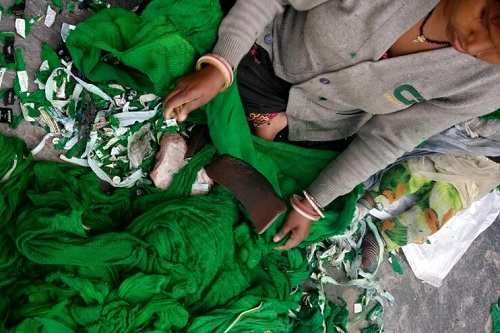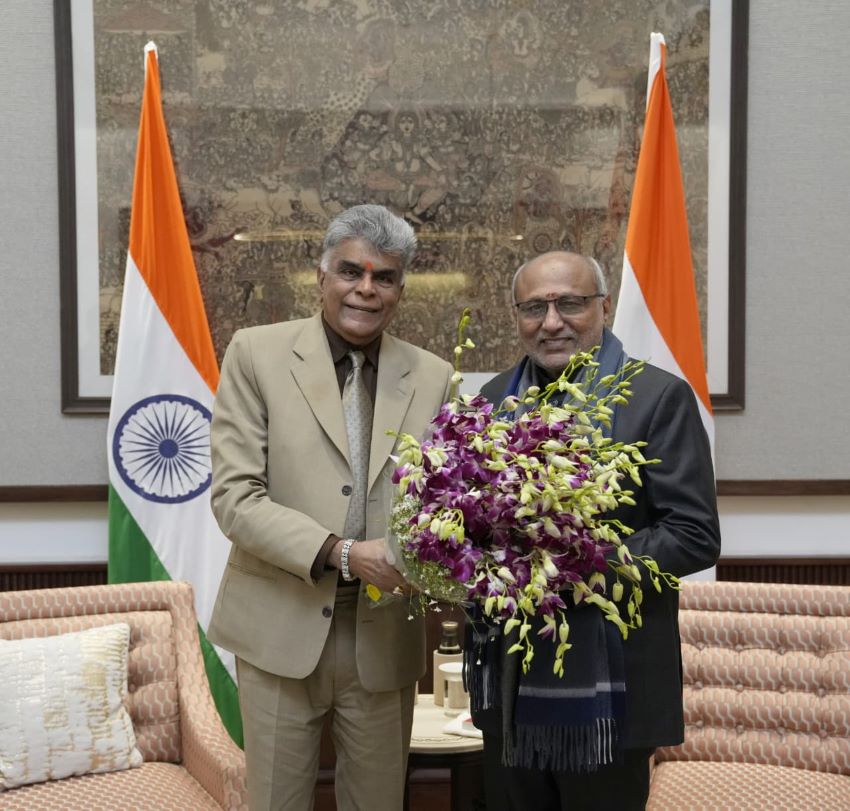 Fashion for Good, the global platform for fashion and textile innovation for a better tomorrow, launched the ‘Sorting for Circularity Project’ in India to understand the pre-consumer and post-consumer textiles waste streams. This consortium project to pilot sorting and mapping solutions in India, aims to build an infrastructure towards greater circularity for future.
Fashion for Good, the global platform for fashion and textile innovation for a better tomorrow, launched the ‘Sorting for Circularity Project’ in India to understand the pre-consumer and post-consumer textiles waste streams. This consortium project to pilot sorting and mapping solutions in India, aims to build an infrastructure towards greater circularity for future.
With the Sorting for Circularity India Project, Fashion for Good calls on stakeholders within the textile waste sector in India to collaborate to map the Indian textile waste landscape. Data and resources volunteered are crucial to obtaining real world estimates beneficial to mapping the landscape and successfully testing technologies that are best placed to address the challenges.
Working for a better Tomorrow
The project is a joint initiative of Fashion for Good with partners, adidas, Levi Strauss & Co., PVH Corp, Arvind Limited, Birla Cellulose and Welspun India. A key technology partner for the project is Fashion for Good innovator Reverse Resources who provides the analysis of pre-consumer textile waste streams in addition to designing and running the pre-consumer pilot. The project is supported through catalytic funding provided by Laudes Foundation.
Arvind Limited, Birla Cellulose and Welspun India. A key technology partner for the project is Fashion for Good innovator Reverse Resources who provides the analysis of pre-consumer textile waste streams in addition to designing and running the pre-consumer pilot. The project is supported through catalytic funding provided by Laudes Foundation.
Mapping India’s textile waste landscape
As a strong textiles manufacturing and consuming country, India offers a large streams of pre-consumer as well as domestic post-consumer waste. In fact, pre-consumer waste is only partially recycled, with the remaining portion mostly downcycled to products of inferior quality. And domestic post-consumer waste is tough to trace, with limited data to understand waste, quantities, composition, and other factors key to recycling. As Katrin Ley, Managing Director, Fashion for Good says, “India is a critical hub, not only for textile production and consumption, but also as a global post-consumer textile waste destination. This project is pivotal to understanding the size of this considerable market and providing the incentive, tools and means for the industry to benefit from the wealth of this untapped resource.”
In fact, India is also one of the largest recipients of global post-consumer textile waste, with millions of tonnes, worth over €100m, of discarded textile being brough into the country and then manually sorted at various hubs. What’s more, there is very little information on this imported waste.
Moreover, there are no technologies that organize, categorise and sort materials to ensure quality textile waste is accessible for recyclers, who require sorted feedstocks in large volumes. Other challenges for recyclers include significant barriers to the growth of chemical recycling technologies in India.
The Sorting for Circularity India project will address all these challenges and build an accessible infrastructure for manufacturers, sorters, collectors, waste handlers and recyclers in India. Over 15 months, the project will demonstrate a new textile value chain across three phases. Firstly, by obtaining an overall understanding of the textile waste supply chain of pre- and post-consumer textile waste in India. Secondly, by identifying and piloting technologies that enable the traceability of textile waste and its accessibility to existing recyclers. Thirdly, it will be providing recyclers access to textile waste feedstocks that meet the quality parameters of advanced recycling technologies, giving these technologies an incentive to scale in India.
Partner Support
Many Indian textile manufacturers have collaborated on this project. As Abhishek Bansal, Head Sustainability, Arvind explains. “Recycling technologies are going to be the future of the industry and to get there we need access to traceable, high-quality textile waste for all waste streams. We will be looking at efficiently recycling traceable textile waste and help along in building a new textile waste value chain in India. This project is a great opportunity to help organise the India textile waste market, making it traceable and accessible to recyclers, manufacturers, and brands.”
Birla Cellulose is also partnering this project as H K Agarwal, Business Director Designate, Birla Cellulose opines “A collaborative approach to building a reliable and robust supply chain of pre- and post-consumer waste is crucial for scaling the circular business model for the fashion industry and for Birla Cellulose to reach our ambitious goal of scaling circular fibres such as Liva Reviva to 100,000 tonnes per year by 2024. This project can have a huge social impact by creating more value from waste by collection, segregation and upscaling of textile waste and create a win-win situation for all stakeholders while making fashion more sustainable. Birla Cellulose is excited to be part of this partnership.”












